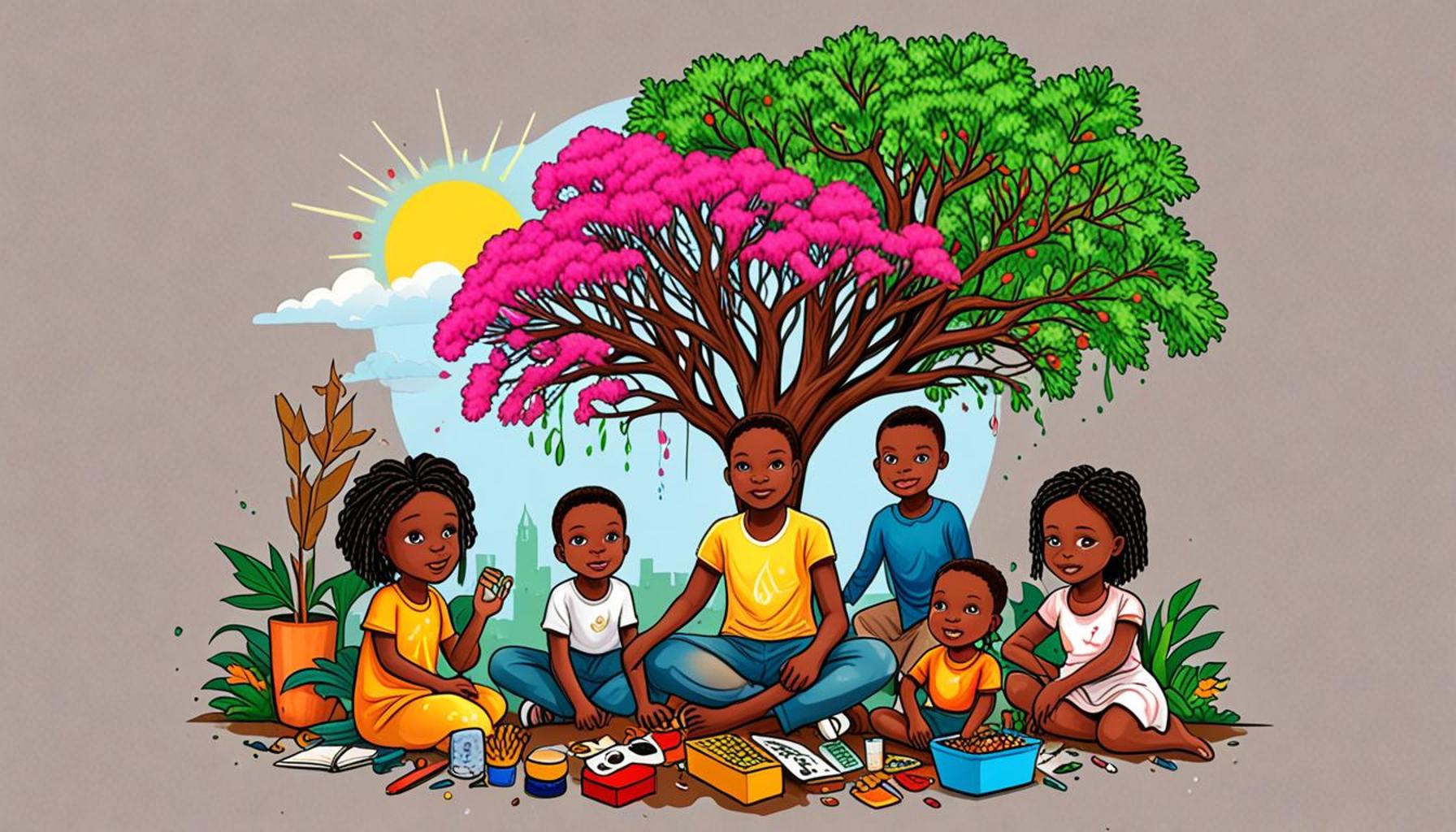Resilience as a Tool for Social Change: Developing a Growth Mindset in Nigerian Communities

The Vital Role of Resilience in Social Change
In a nation as diverse and vibrant as Nigeria, resilience stands out as a crucial factor in navigating the myriad challenges that communities face daily. This resilience is not merely about enduring hardship; it encompasses the spirit of adaptability and innovation, enabling individuals and societies to thrive despite socio-economic hurdles. As many Nigerians confront issues such as economic instability, inadequate access to education, and infrastructural shortcomings, developing a growth mindset becomes a transformative tool for empowerment.
Central to understanding resilience are key components that define how communities respond to adversity. One essential factor is adaptability. This quality allows individuals to pivot in response to unforeseen circumstances. For instance, many Nigerian farmers have adopted innovative agricultural techniques and diversifications in response to climate change and fluctuating market demands. By embracing new methods, such as intercropping or adopting climate-resilient crops, they have not only secured their livelihoods but also contributed to food security in their communities.
Another pillar of resilience is perseverance, which manifests in the indomitable spirit of the Nigerian people. Amidst numerous challenges, the drive to pursue education, improve living conditions, and seek economic opportunities remains strong. The story of young Nigerians who have risen from challenging backgrounds to establish successful startups underscores this spirit. For example, techpreneurs in cities like Lagos and Abuja are creating solutions to local problems, demonstrating that with persistence, the youth can shape the future landscape of technology in Nigeria.
Community support plays an equally vital role in fostering resilience. In many Nigerian communities, local networks or groups provide emotional and tangible assistance to individuals facing hardships. The concept of “Ubuntu” exemplifies this communal spirit—where the well-being of one is intrinsically linked to the well-being of others. Such networks offer mentorship, health services, and financial aid, empowering community members to rise together. For instance, initiatives like the Women’s development cooperatives not only elevate social status but also provide financial literacy training and entrepreneurial guidance, significantly enhancing the economic standing of women and their families.
A growth mindset further emphasizes the importance of reframing failures as stepping stones to success. In Nigeria, organizations that promote entrepreneurial thinking have reported remarkable progress among participants. Workshops that teach young people to embrace challenges and view setbacks as opportunities have become instrumental in launching various successful ventures. Such shifts in thinking cultivate not only personal resilience but also the collective strength of communities as they face shared adversities.

As we embark on a deeper exploration of resilience in Nigeria, we will highlight real-world examples and strategies that showcase this transformative power. From grassroots movements to national initiatives, the stories of individuals and communities overcoming adversity serve as powerful catalysts for social change. This journey into resilience reveals its profound implications and the untapped potential within Nigerian communities, encouraging readers to reflect on their roles in fostering a resilient future.
CHECK OUT: Click here to explore more
Harnessing Resilience: A Path to Empowerment
As the tapestry of Nigerian society unfolds, we find an intricate blend of cultures, traditions, and challenges. The country’s populous regions are often marked by disparities in wealth, education, and access to resources. However, within this complex framework lies the potential for profound social change, driven by the resilience of its people. By leveraging the innate capacity for growth and transformation, communities can foster a growth mindset that transcends individual obstacles, catalyzing collective healing and progress.
The first step in fostering resilience within Nigerian communities involves cultivating an understanding of personal and community strengths. Local leaders and educators are encouraged to initiate programs that focus on recognizing these strengths, which can be leveraged to combat socio-economic challenges. A prime example includes community-driven forums where members share success stories, thereby inspiring others to adopt a similar spirit of innovation and perseverance.
Key Strategies for Developing Resilience
To effectively nurture resilience and a growth mindset, several key strategies can be employed:
- Education and Skill Development: Access to quality education remains a pressing issue in Nigeria. Programs that focus on practical skills—such as vocational training, digital literacy, and entrepreneurship—enable individuals to adapt in a rapidly changing economic landscape. For example, initiatives like the National Youth Service Corps (NYSC) Skills Acquisition and Entrepreneurship Development (SAED) program equip young graduates with essential skills necessary to thrive.
- Community Engagement: Mobilizing community spirit through engagement initiatives is vital. Cultural events, health fairs, and social awareness campaigns can foster a sense of unity and shared purpose. The Community Development Associations (CDAs) exemplify this by encouraging local participation in decision-making processes, ultimately enhancing community resilience.
- Mental Health Support: The stressors stemming from socio-economic challenges can deeply affect mental health. Establishing support networks and counseling services can provide emotional resilience to individuals, helping them to cope with difficulties and remain focused on their goals. Grassroots organizations like Together Nigeria are making strides in addressing these mental health challenges by facilitating workshops and creating safe spaces for dialogue.
Through these strategies, communities can begin to see the fruits of their resilience through strengthened interpersonal connections and enhanced individual capabilities. As more individuals embrace a growth mindset, the narrative of struggle can shift towards one of optimism and possibility.
The pathway to resilience does not lie solely within individual action; it requires a collective commitment from all sectors of society, including government, non-profits, and the private sector. Each has a role to play in fostering a supportive ecosystem that values learning from failure and encourages risk-taking as a necessary step on the journey toward success.
In exploring these dynamics, we begin to unearth stories of perseverance and triumph that can inspire broader social transformation across Nigeria. By nurturing resilience as a tool for social change, communities not only address immediate needs but also lay the groundwork for sustainable futures, ripe with opportunities for generations to come.
Resilience as a Cornerstone for Progress
In the dynamic landscape of Nigerian communities, resilience emerges as a vital force driving social change. It fosters a growth mindset, which invites individuals to embrace challenges and view failures as stepping stones to success. This shift in perspective is essential for personal and community development.
To harness resilience effectively, educational initiatives are being tailored to address the unique socio-economic challenges faced by these communities. Programs that promote skill acquisition and entrepreneurship encourage individuals to innovate and think critically. By cultivating a culture of learning and adaptability, communities can pivot from traditional practices to more sustainable and productive enterprises.
Additionally, grassroots movements are essential in promoting mental health awareness. Resilience training equips individuals with the tools to cope with stress and adversity, thus enhancing overall community well-being. Workshops focusing on emotional intelligence and self-regulation are being implemented, fostering a supportive environment where individuals can thrive.
Moreover, collaboration between local governments, NGOs, and communities is vital for implementing resilient practices. Strategies that engage community members in decision-making processes not only empower individuals but also create a sense of ownership and accountability. This collaborative approach ensures that solutions are tailored to the local context, respecting cultural nuances while driving positive change.
As we delve deeper into this theme, it is imperative to explore the numerous success stories emanating from these resilience-focused initiatives. Communities that have embraced change, albeit gradual, are setting examples, showcasing the power of a growth mindset in transforming their realities and trajectories.
| Advantages of Resilience | Impacts on Communities |
|---|---|
| Empowerment | Individuals gain confidence, leading to personal and collective growth. |
| Innovation | Encourages creative solutions to local problems, enhancing community resilience. |
| Social Cohesion | Fosters stronger community bonds and collaboration towards common goals. |
| Improved Mental Health | Resilience training reduces anxiety and fosters overall psychological well-being. |
This transformative journey towards resilience requires commitment and an open mind. By investing in a growth mindset, Nigerian communities can not only overcome challenges but also lay the groundwork for a more prosperous future. Exploring further into methodologies and specific community-led interventions will shed more light on the effectiveness of resilience as a driver for change.
LEARN MORE: This related article may interest you
Building Networks of Support: The Role of Collaboration
In the journey toward nurturing resilience, the significance of collaboration among stakeholders cannot be overstated. When individuals, organizations, and government bodies work together, they create a reinforced framework that encourages growth and sustainability. This collaboration can take various forms, ranging from public-private partnerships to grassroots movements that harness the power of collective action. For instance, initiatives like the Youth Enterprise with Innovation in Nigeria (YouWin) program mirror this approach by uniting resources from different sectors to support young entrepreneurs, fostering an atmosphere of shared success.
A critical element in this collaboration is the establishment of mentorship programs. Experienced professionals from various fields can volunteer their time to guide the youth, helping them navigate the complexities of entrepreneurship and social activism. These mentorships not only provide valuable knowledge and skills but also instill a sense of hope and ambition in young individuals, which in turn fosters a growth mindset. Programs by organizations like Mentorship Initiatives and local universities play a pivotal role in breaking barriers and connecting aspiring entrepreneurs with seasoned professionals.
Leveraging Technology for Empowerment
The advent of technology has ushered in new avenues for resilience to manifest in Nigerian communities. Digital platforms not only enhance communication but also create opportunities for education and economic participation. The Rise Up initiative is a prime example, harnessing social media to disrupt traditional barriers. It organizes online workshops and webinars that empower individuals with the knowledge necessary to create social change from their homes. By engaging with these platforms, communities can share resources, exchange ideas, and cultivate a spirit of innovation that is critical when confronting socio-economic challenges.
Furthermore, the integration of technology in educational settings is paramount. As schools adapt to digital learning modalities, access to online resources becomes more imperative. Programs that focus on providing affordable internet access to rural areas, such as GIG Telecom’s initiatives, ensure that opportunities are not limited to urban centers. This democratization of information plays a crucial role in developing a generation with a growth mindset, better equipped to seize opportunities and initiate change.
Cultivating a Culture of Continuous Learning
Central to the idea of resilience is the necessity of fostering a culture that embraces continuous learning. This shift can be realized through the establishment of community learning hubs where individuals can pursue both formal and informal educational opportunities. Libraries, training centers, and even informal gatherings in community spaces facilitate the sharing of knowledge and experiences, creating environments that nurture innovation.
In regions where educational institutions may be lacking, local cooperation among community members can pave the way for alternative learning methods. Experiential learning—such as hands-on workshops, skill-share sessions, or community projects—enables individuals to acquire practical skills while reinforcing the principles of resilience and adaptability.
Additionally, recognizing and rewarding those who exemplify a growth mindset within their communities plays a crucial role in encouraging others to adopt similar behaviors. Initiatives that honor “local heroes,” such as community developers or successful entrepreneurs, can inspire others to engage in personal growth and contribute to social change.
With each of these strategies working in concert, Nigerian communities can harness their resilience to craft a brighter future. A culture that values collaboration, utilizes technology effectively, and prioritizes continuous learning is essential in championing a growth mindset, enabling individuals and communities to rise above their challenges and evolve into agents of transformative social change.
RECOMMENDED: Check out this similar article
Conclusion: Crafting Resilient Futures through a Growth Mindset
In navigating the complexities of social change, resilience emerges as a formidable tool, particularly within Nigerian communities. As elaborated throughout this article, the synergy of collaboration, the power of technology, and the importance of continuous learning are foundational elements in fostering a robust growth mindset. By weaving these components together, communities can establish a resilient framework capable of overcoming socio-economic challenges and addressing systemic barriers.
The strategies highlighted—such as mentorship programs, digital empowerment initiatives, and community learning hubs—underscore that change is not only possible but achievable when supported by a collective effort. The inspiring examples of programs like YouWin and Rise Up demonstrate how collaboration can spark innovation, while local heroes serve as exemplars of what is attainable through perseverance and ambition.
Moreover, as Nigerian youths increasingly embrace the opportunities offered by technology and education, it becomes evident that a culture of learning is essential for the empowerment of future generations. Encouraging a mindset that values persistence, adaptability, and growth is crucial; such an ethos can steer communities toward sustainable development and long-lasting social transformation.
Ultimately, if Nigerian communities harness their inherent resilience and strive to cultivate a growth mindset, they will not only weather contemporary challenges but also pave the way for a future where all individuals can thrive. The path ahead is defined by the collective action and steadfast belief in the potential of each community member to effect change. As the adage goes, “together we can achieve more,” and it is by choosing resilience that we can truly reshape the narrative of our society.


